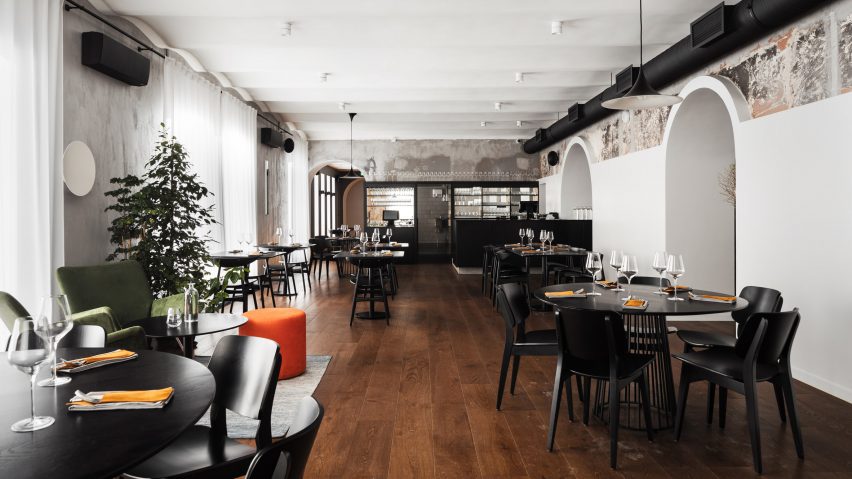Bureau Rhizome's interior for this contemporary Russian restaurant is influenced by a neighbouring Danish design school.
As well as the aesthetic connection, the 46-seater restaurant serves Scandinavian food, paying tribute to the geographical proximity between St Petersburg and the Nordic states.
Gastrobar O sits on the ground floor of a 20th century mansion. Bureau Rhizome created an interior aesthetic that aims to enter into a dialogue with the Danish design school, and is modelled on the functional and minimal principles of Scandinavian design.
The result is a balance between St Petersburg's cosmopolitan roots and the clean lines of Scandinavian design.
The designers chose simple wooden floors and left much of the original multilayer plaster and brickwork exposed on the walls.
"The untouched layers and textures on the walls remind us of the period of the turbulent 1990s with its squat movement, the spirit of self-organisation and freedom," said Bureau Rhizome.
"Whereas new materials such as matte concrete, white tile and wood make this canvas complete."
The vaulted ceiling lends a sense of spaciousness to the open-plan rooms, while an arched passage way separates the functional spaces of the bar and restaurant area.
"The arched passage was here before the reconstruction. In the new design, it is covered with a white case to resemble an art object," said the designers.
A change in floor height also adds to the spatial arrangement — the lounge area next to the bar is raised on a podium. The contours of the bar counter and the service bureau flow continuously from one room to the other to connect the two.
As a result, the space offers various activities: it is simultaneously a bar, a restaurant and a casual meeting place.
Monochromatic black tables and chairs are used throughout Gastrobar O.
This dark furniture is interspersed with occasional flashes of orange and green colours, for example in the tableware in the restaurant as well as custom-made pieces and design classics like green vintage chairs by Finnish designer Yrjö Kukkapuro.
The bathrooms feature minimal white tiles and circular portal-like windows which offer a view back into the restaurant space.
In planter pots throughout the bar and restaurant the designers have included greenery typical of St Petersburg's winter gardens.
Russian architects Asya Baranova and Nikolay Pokorsky also combined planting and a restrained interior aesthetic for a vegetarian cafe that occupies a former Soviet-era furniture store.

